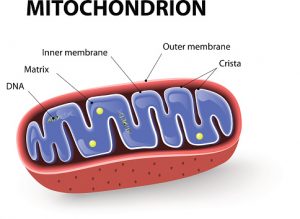
Mitochondria are often referred to as the powerhouse of cells; they generate the energy which allows our cells to perform their many different functions. Brain cells, for example, require high amounts of energy in order to communicate with the many parts of the body – especially the parts which are furthest away from the brain. Additionally, cells in muscles also require high amounts of energy in order for us to be able to move.
Role of mitochondria in energy production
When trying to understand the role of mitochondria in energy production, it’s easiest to think of a battery. Mitochondria generate chemical energy similar to a battery. The energy produced by mitochondria is referred to as adenosine triphosphate, or ATP. ATP is the energy which essentially keeps us alive and is used up by all the cells in the body. Mitochondria produce ATP through an electron transport train; four complex groups of proteins are used to complete the electron transport train by working together, and a fifth protein then finalizes the process.
Electrons – atoms with a negative charge – pass between the complexes of the electron transport train, allowing the cell to create energy. The first complex accepts electrons which are produced from the food we eat. This allows the third complex – protons – to move across the inner mitochondrial membrane. In this phase, complex one and two join together and are passed onto complex four. Complex four moves more protons across the inner mitochondrial membrane. Electrons are then joined with oxygen which produces water. With the excess of protons it creates a gradient which is used in complex five to finalize the electron transport train and produces ATP.
How impaired mitochondria causes a drop in energy levels

First author Divya Pathak said, “It was always assumed that defects in mitochondria would result in a depletion of energy levels, which would be toxic to neurons. But no one had been able to prove this because the necessary assays were not available. Now that we’ve demonstrated the link between impaired mitochondria, a loss of ATP, and neuronal dysfunction, the next step is to see if this connection holds true in conditions like Parkinson’s disease and Alzheimer’s disease.”
Furthermore, while applying their new assays in healthy neurons, researchers were also able to determine how brain cells release neurotransmitters in order to communicate with each other.
Other health issues due to mitochondria impairment
Aside from a lack of cellular energy and neuronal dysfunction, there are other health issues which are caused by mitochondria impairment. Because the mitochondria are found in all cells and are required for proper cell function, mitochondria impairment can result in other health issues as well, including:
- Breathing problems
- Cardiac issues
- Kidney problems
- Gastrointestinal problems
- Diabetes
- Problems with the endocrine system
- Skeletal muscle issues
- Liver disease
- Seizures
- Visual/hearing problems
- Lactic acidosis
- Susceptibility to infection
- Alzheimer’s disease
- Parkinson’s disease
- Autoimmune diseases
As you can see, mitochondria impairment can affect all parts of the body due to its vital role and placement in all the cells in the body.
Related Reading:
Sometimes it feels like no matter how much sleep we get we still lack energy. Lack of energy can get worse, too, the older we become. With other medical conditions and the use of medications we may have much less get-up-and-go than we once had, so we find ourselves cooped-up inside, counting down until we can fall back asleep. Continue reading…
Effects of sleep deprivation on energy levels
Sleep pertains to an actual phase in which both the body and mind are allowed to rest. During sleep, a person is generally inactive and thus, not aware of his or her immediate surroundings. Individuals experiencing sleep problems due to physical and/or mental health conditions such as stress are likely unable to get enough rest each night. Continue reading…
Sources:
http://www.news-medical.net/news/20150915/Study-shows-link-between-impaired-mitochondria-energy-failure-and-neuronal-dysfunction.aspx
http://www.nature.com/scitable/topicpage/mitochondria-14053590
http://www.umdf.org/site/c.8qKOJ0MvF7LUG/b.7934627/k.3711/What_is_Mitochondrial_Disease.htm
http://www.mda.org/disease/mitochondrial-myopathies/signs-and-symptoms
http://www.umdf.org/site/pp.aspx?c=8qKOJ0MvF7LUG&b=7934637